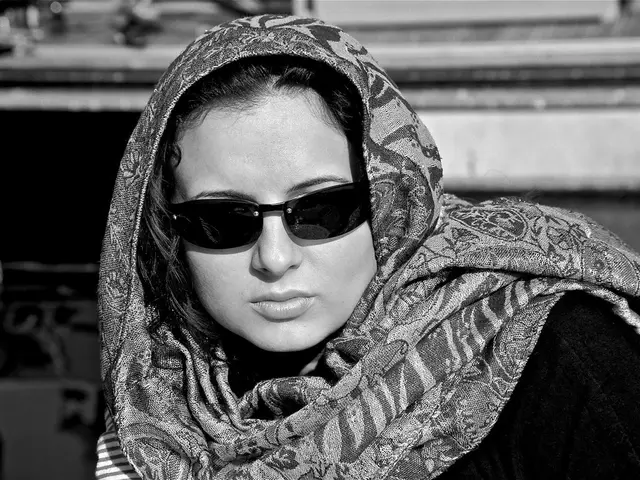Marie Curie's trailblazing research revolutionized the realms of radioactivity and medicine, reshaping the global understanding of these fields.
The Unyielding Pioneer: A Fresh Glimpse on Marie Curie's Groundbreaking Achievements
Marie Curie, once just Maria Skłodowska of Warsaw, Poland, defied societal norms to emerge as an unmatched scientific trailblazer. Her journey from humble beginnings to reveling in the limelight of breakthrough discoveries is one that transcends scientific virtuosity.
Born to Dare, Engineered to Shine
Cherished in academia and admired across borders, Marie Curie slew numerous obstacles to disprove the adage that women possess limited potential in the realm of science. Her amazing intelligence and fierce determination allowed her to excel in mathematics and physics at the Sorbonne, despite fewer opportunities for her gender.
The Nexus of Radioactivity
At the precipice of the 20th century, Marie Curie found herself captivated by uranium rays. Building upon the groundwork laid by Henri Becquerel, she deduced that radioactivity wasn't merely a byproduct of a chemical reaction, but rather an inherent quality of certain elements themselves. This groundbreaking insight catapulted her onto the global research stage and paved the way for her discoveries of polonium and radium.
A Stellar Tribute for a Galactic Mind
Marie Curie's accomplishments off the lab benches have left an indelible mark on history. She was the first woman to receive a Nobel Prize in two different scientific categories - Physics (shared with her husband Pierre Curie and Henri Becquerel) and Chemistry. Her accolades paid tribute to her trailblazing work in radioactivity and the study of radioactive substances.
Arming the Medical Frontier: Cancer, Radiotherapy, and Victorious Battles
One of the most profound impacts of Marie Curie's work is her role in cancer treatment, particularly radiotherapy. The potency of radiation, harnessed by her discoveries of radium and its radioactive properties, has been instrumental in the destruction of cancerous cells, saving countless lives.
The Future in Her Rearview: Advancements and New Horizons
Beyond cancer research, Marie Curie's work established a foundation for a myriad of scientific advancements in nuclear physics, chemistry, and beyond. Her meticulous methods in isolating radioactive isotopes paved the way for the examination of atomic structures and behaviors, galvanizing further exploration in various scientific disciplines.
Immortalized Legacy and the Impact of a Brainchild
Marie Curie's legacy lives on long after her groundbreaking work in radioactivity redefined the scientific world. She continues to inspire aspiring minds, particularly young women, who dare to traverse the untrodden paths of science. Her Curie Institutes, nestled in the heart of Paris, continue her mission, shaping the future of medical research and education.
A Blessing and a Curse: Ambiguous Obsession with the Radiant
The unforeseen consequences of Marie Curie's relentless pursuit of knowledge came in the form of health complications arising from prolonged exposure to radioactive materials. Her sacrifices serve as a stark reminder of the importance of prioritizing safety and ethical considerations in scientific research.
Reflections: On a Legacy So Nearly Immeasurable
Marie Curie's pioneering work in radioactivity has undeniably changed the world, with profound implications in the fields of science and medicine. Her findings laid the foundation for progress in cancer treatment via radiation therapy, and her legacy continues to permeate the advancements in medical imaging technologies today. Curie's story personifies the power of perseverance, intellectual curiosity, and revolutionary revelation within the infinite pursuit of knowledge.
Trizzy Orozco
Marie Curie's contributions to cancer treatment have had a far-reaching impact on the medical world:
Catalyzing Cancer Treatment
Marie Curie's work played a significant role in the development of radiation therapy, allowing doctors to target and destroy cancer cells with relative precision.
- Radiation Oncology Advancements: By laying the groundwork for radiation therapy, Curie's research paved the way for the creation of modern equipment and technologies, such as linear accelerators. These machines deliver precise, targeted doses of radiation to cancerous tumors while minimizing damage to healthy surrounding tissues[1][2].
- Improved Treatment Options: Marie Curie's research has made it possible for radiation oncologists to fine-tune their treatment plans, tailoring them to each individual patient based on factors like tumor size, stage, and location.
Marie Curie's findings also have profound implications in the field of medical imaging:
The Dawn of Medical Imaging
While not directly responsible for the invention of MRI or CT scans, Marie Curie's work has led to advancements in several imaging techniques.
- Nuclear Medicine: Curie's research on radioactive isotopes has provided the foundation for nuclear medicine techniques, which enable doctors to visualize and diagnose diseases, including cancer[3].
- PET Scans and Other Imaging Techniques: Marie Curie's work has laid the groundwork for positron emission tomography (PET) scans, which use radioactive tracers to produce detailed images of internal structures and functions. Although Curie didn't directly contribute to the development of these technologies, her foundational work in radioactivity has been instrumental in their advancement[3].
- Marie Curie's dedication to understanding radioactivity paved the way for subsequent research in women's health, providing new strategies for detecting and treating medical conditions with the aid of radioactive isotopes.
- The Curie Institutes, founded in praise of her groundbreaking achievements, continue to foster academic excellence and encourage the study of health and wellness, particularly with respect to women's health.
- In the realm of scientific discoveries, Marie Curie's work on polonium and radium serves as a testament to the interconnectedness of physics and chemistry, while also necessitating further research into their possible applications within various medical-conditions and health-related disciplines.
- Though marred by health complications as a result of prolonged exposure to radioactive materials, Marie Curie's story serves as a symbol of perseverance, emphasizing the importance of safe practices and ethical considerations in the journey towards scientific discovery.








